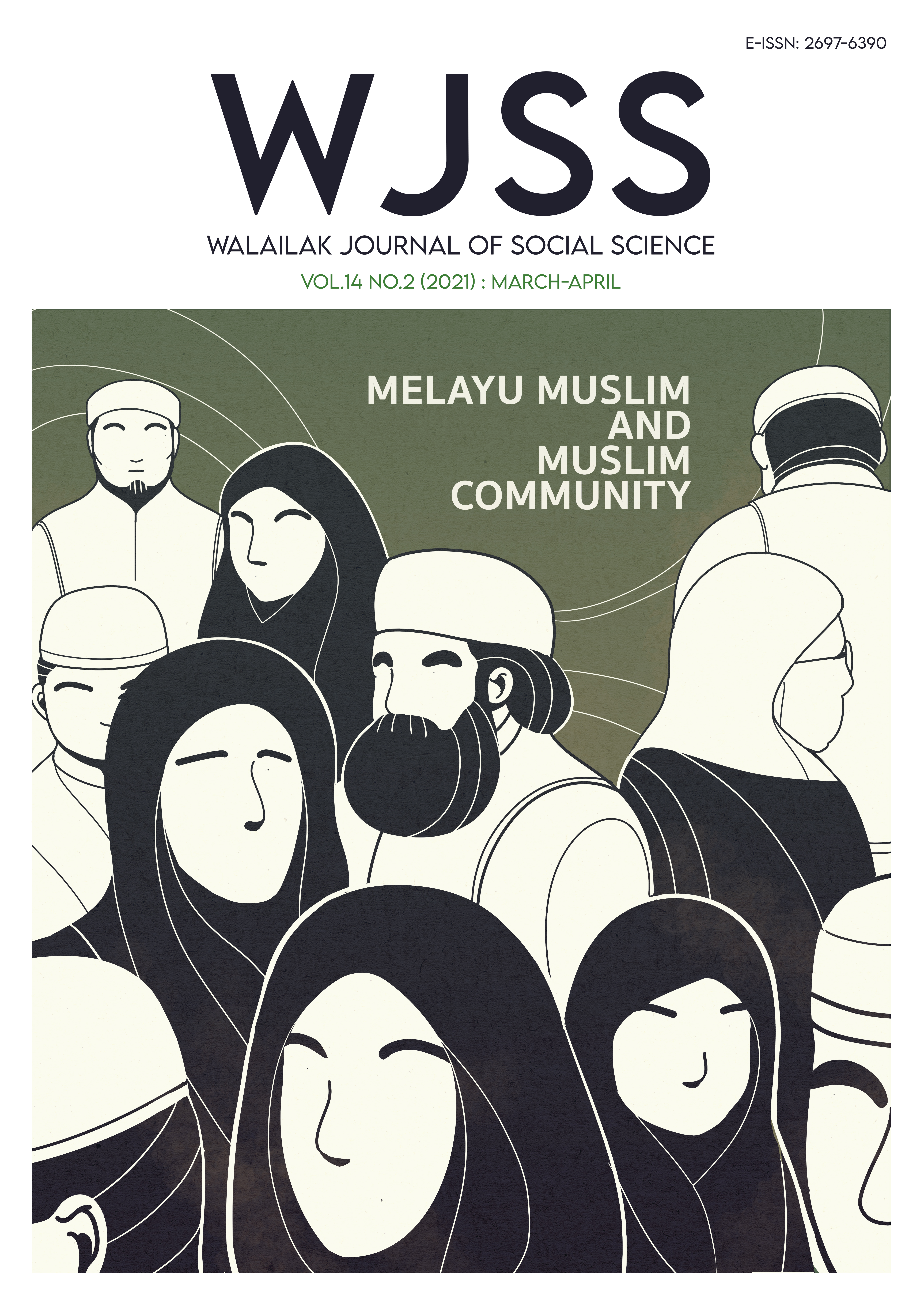Concept and Theory of Identity Politics and the Representation of Melayu Muslims in the Deep South of Thailand
Main Article Content
Abstract
The qualitative research titled “Dynamics of Melayu Muslim Politicians’ Movements amidst the Violence in the Southern Border Provinces” has applied the concept of identity politics to attempt to discover the connections between identity politics, representatives, and Melayu Muslims in the movement of Melayu-Muslim politicians in the Deep South of Thailand. This article is part of the research paper that brought up the idea of identity politics in connection with the movements in the Deep South. It argued that the access to the power structure of identity representation is one of the approaches to aid in the preservation of an individual’s own identity. The research argues that if the identities are respected equally, it is likely that the motivation to ignite oppressive violence could be reduced. On the one hand, identity politics may further lead to the construction of “others” versus “us”. On the other hand, it could lead to the reduction of violent conditions if identity is protected in the political space. In relation to Muslim identity, the concepts of ‘political Islam’, ‘post-Islamism’ or ‘post-secularism’ have been brought up to explain the visibility of Muslim identity in the political domain. The Melayu Muslims in the Deep South of Thailand have a unique identity and one of the main causes of the ongoing conflict in the area is the historical invisibility and suppression of their identity. The solution to the conflict of identity politics and marginalization is to revive and create legitimate power of the people living there by supporting conflict management authority at local, national and international levels. Therefore, it could be stated that the parliamentary system is the hope that people can attempt to build political bargaining space to promote the full representation of Muslim or Melayu identity which will, eventually, reduce the conditions leading to violence.
Article Details
Copyright: CC BY-NC-ND 4.0
References
Aimauryut, S. (2016). It is hard to be Melayu. Bangkok, Thailand: Matichon.
Banpasirichote, C. (2009). Minority protection and politics of different identities: European experience. Bangkok, Thailand: Friedrich Naumann Foundation.
Chaivised, D. (2017). Where do the 250 senetors come and what do they work?. Retrieved from http://library2.parliament.go.th/ebook/content-issue/2560/hi2560-071.pdf
Eoseewong, N. (2007). Malay study: Introduction to Malay Muslims in the south. Bangkok, Thailand: Amarin Press.
Eoseewong, N. (2019). Post-cold war identity politics. Retrieved from https://www.matichonweekly.com/column/article_168418
Garza, A. (2019). Identity politics: Friend or foe? Retrieved from https://belonging.berkeley.edu/identity-politics-friend-or-foe
Heredia, R. C. (2006). Sinking old horizons, imagining new ones: Debunking exceptionalism. Economic and Political Weekly, 41(33), 3586-3589.
Jitpiromsri, S. (2017). Politics and conflict management in the Deep South. Faculty of Political Science, Prince of Songkhla University, Pattani Campus, Thailand.
Kabir, N. A. (2015). Muslim Identity Formation in the West: The Case of Australian, British and American Muslims. Muslim identity formation in religiously diverse societies, 105-26.
Kiewiet, D. R., & McCubbins, M. D. (1991). The logic of delegation. University of Chicago Press.
Konuralp, E. (2020). Limits of Post‐Secularism in Turkey: Comparing the attitudes of the Justice and development party towards the headscarf and Alevi issues. Religion Compass, 14(6). e12352.
Kruks, S. (2001). Retrieving experience: Subjectivity and recognition in feminist politics. Ithaca, NY: Cornell University Press.
Leach, C. W., Brown, L. M., & Worden, R. E. (2008). Ethnicity and identity politics. Science, 32(3), 415-434.
McCargo, D. (2015). Tearing apart the land: Islam and legitimacy in Southern Thailand. NY: Cornell University Press.
Milner, A. C. (2008). Kerajaan: Malay political culture on the Eve of Colonial rule. Bangkok, Thailand: Muangboran Press.
Parekh, B. (2008). A new politics of identity: Political principles for an interdependent world. Macmillan International Higher Education.
parliament_parcy/ewt_dl_link.php?nid=43645
Ramadan, T. (2004). Western Muslims and the future of Islam. Oxford: Oxford University Press.
Rong, M. (2010). A new perspective in guiding ethnic relations in the twenty-first century: ‘De-politicization’ of ethnicity in China. Procedia-Social and Behavioral Sciences, 2(5), 6831-6845.
Sahoh, I., & Thongfuea, S. (2014). Peacebuilding through political Islam. In Proceeding of the 2nd National Conference on Islamic and Muslim Studies. Pattani, Thailand: Prince of Songkla University.
Sahoh. I., & Sattar, Y. (2016). Political Islam in Southeast Asia: Standpoint, position, and Muslim political movements in democratic system. Journal of Humanities and Social Sceinces, Thaksin University, 10(2), 65-87.
Serirangsan, T. (1989). Contemporary problems of Thai politics. Bangkok, Thailand: Sukhothai Thammathirat Open University Press.
Shamsul, A. B. (2005). Islam embedded: Religion and plurality in Southeast Asia as a mirror for Europe. Asia Europe Journal, 3(2), 159-178.
Sompitak, S. (2011). Correlations between senators being good politicians and corresponding psychological factors (Master’s thesis). Bangkok, Thailand: Ramkhamhaeng University.
Srimuangkanchana, C. (2018). Roles of the parliamentary representatives in the 2017 Thailand’s constitution. Retrieved from https://www.parliament.go.th/ewtadmin/ewt
Stanford University. (2016). Identity politics. Retrieved from https://plato.stanford.edu/entries/identity-politics/
Theerawekin, L. (2006). Thai politics and government. Bangkok, Thailand: Thammasat University Press.
Tuansiri, E. (2010). The politics of identity: Diversity and dynamics of “Pattani Malay Muslim” in the Deep South (Master’s thesis). Bangkok, Thailand: Chulalongkorn University.
Wiarda, H. J. (2014). Political culture, political science, and identity politics: An uneasy alliance. Ashgate Publishing.
Wigmore-Shepherd, D. S. (2012). Ethnic identity, political identity and ethnic conflict: simulating the effect of congruence between the two identities on ethnic violence and conflict. Structure and Dynamic, 5(3), 1-28.
Winichakul, T. (2017). Thais/Others: The others of being Thai. Bangkok, Thailand: Samesky Press.
Younge, G. (2019). The Politics of Identity: From Potential to Pitfalls, and Symbols to Substance. Identities, 26(1), 1-11.
Yuktanan, S. (2013). Identity for tomorrow: The critique of identity politics from Postcolonial School. Social Science Journal, 9(2), 61-103.
Zhanarstanova, M. B., & Nechayeva, E. L. (2016). Contemporary principles of political representation of ethnic groups. Procedia Economics and Finance, 39, 76-82.


